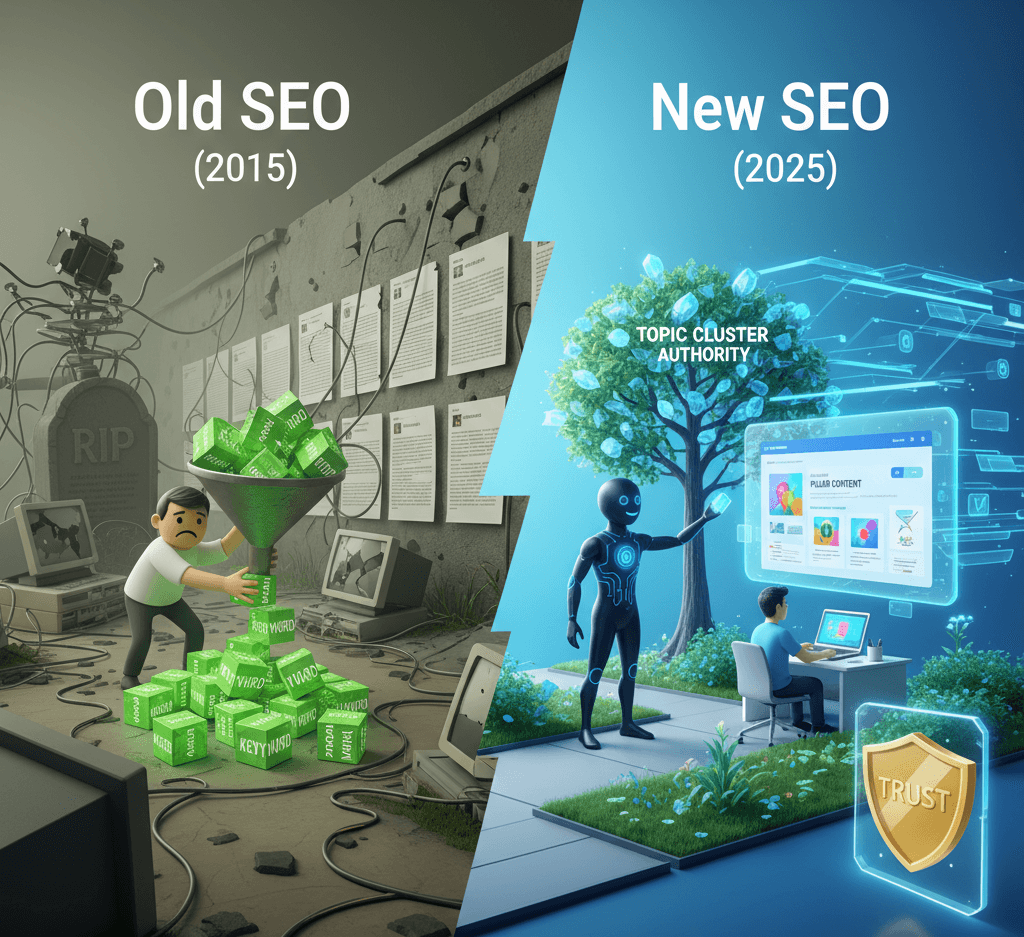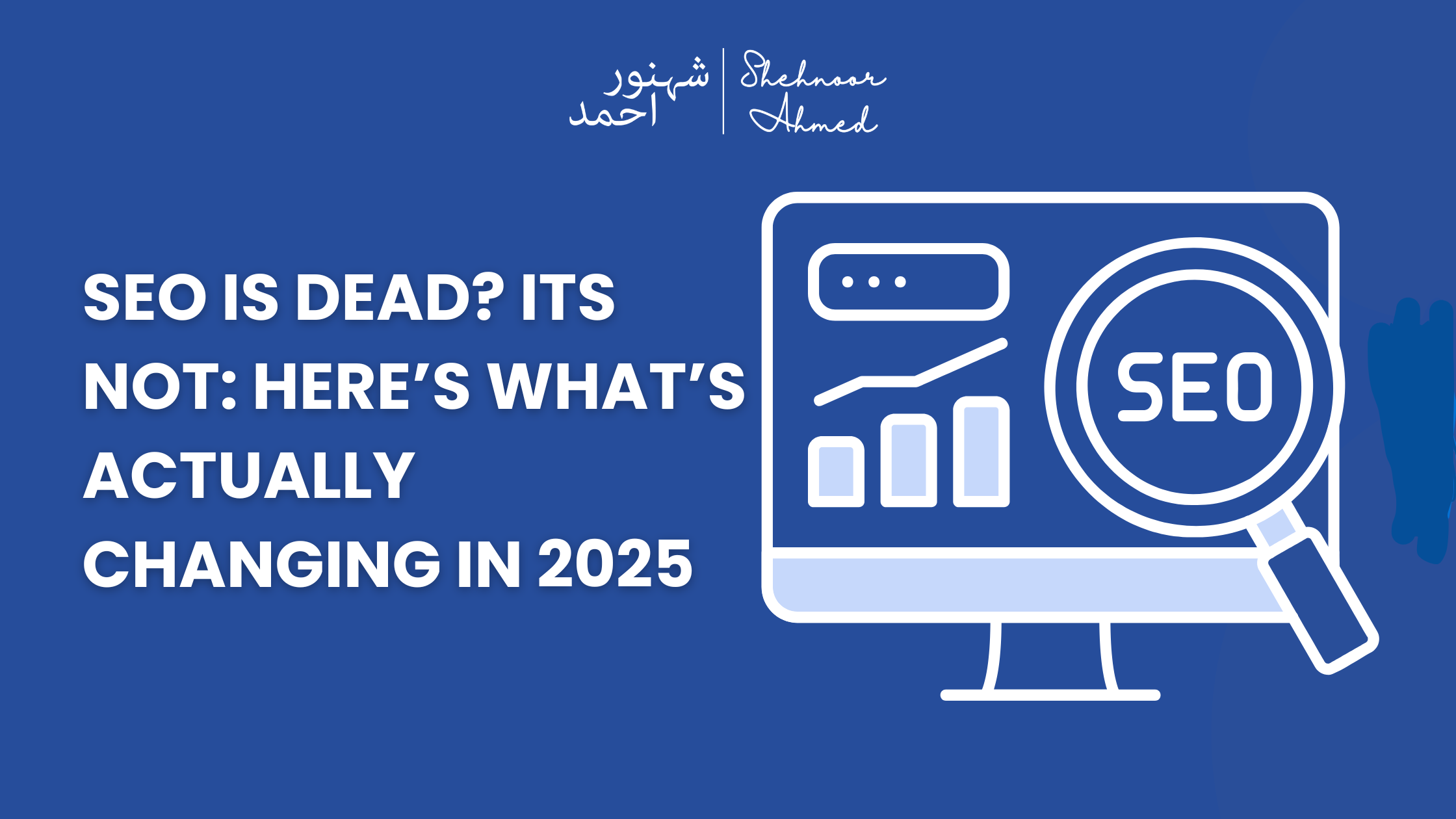Everyone’s saying SEO is dead.
Google’s changing. Rankings are volatile. Organic traffic is harder to earn. “Why even bother with SEO anymore?”
Let’s set the record straight: SEO is not dead. But lazy, outdated SEO? That’s been buried.
We’re not playing the same game we played in 2015, or even 2022. The rules have changed. The user expectations have changed. Google’s understanding of content has changed.
And if you don’t change with it, you get left behind.
Why People Think SEO Is Dead (They’re Wrong)

Here’s why the panic exists:
- Google now answers simple questions directly in search results.
- Fewer people are clicking on basic blog posts that just reword what’s already been said.
- The old tactics, like stuffing keywords or pumping out thin content, just don’t work anymore.
But that doesn’t mean SEO is dead. It means SEO is smarter now, and so are users.
If your content isn’t ranking or converting, it’s not because SEO is gone. It’s because your strategy is outdated.
In fact, what is changing in 2025?
What’s actually causing the shift is as follows:
- Google gives preference to reliable, topic-authority websites.
- Credibility, relevance, and structure are used to evaluate content.
- Consumers want genuine responses, not filler or fluff.
- UX and technical health cannot be compromised.
“Did you use the right keyword?” is less important in today’s searches. and additional information regarding “Are you obviously the best source on this subject?”
From Keywords to Ideas
The phrase “best gym shoes for women” was used twelve times on a page in the old SEO.
2025 SEO: A well-written piece that contrasts different shoe styles and is backed up by authentic reviews, unique images, and internal links to relevant exercise equipment.
Google interprets your content in addition to reading it. It also determines whether your website provides real depth and insight into related subjects.
How to Win in Today’s SEO Landscape
You don’t need 1,000 blog posts. You need authority pages that solve problems, earn trust, and hold attention.
Build Real Topical Authority

Start with a core topic, like skincare, digital marketing, or home renovations. Then build:
- A central pillar page (in-depth and well-structured)
- Interconnected supporting content (answers, comparisons, case studies
- Consistent updates and context that show you know your field
Google wants to reward experts. Not bloggers rewording the top 5 posts on the first page.
UX = SEO
If your page is:
- Slow to load
- Cluttered with popups
- Hard to scan or navigate
…you’re losing visitors and rankings.
Clean design, fast speed, clear headers, and great mobile usability aren’t optional. They’re part of the SEO game now.
Go Beyond Keywords. Deliver Outcomes.
Instead of focusing on word count, focus on:
- Helping the visitor get clarity
- Making it easy to compare options
- Answering questions before they’re asked
- Giving reasons to stay on the page
Technical SEO Still Matters (Maybe More Than Ever)
Great content won’t matter if Google can’t crawl, index, or understand your site.
Here’s what still makes or breaks your visibility:
- Site speed: Fast-loading pages keep users and earn trust
- Clean structure: Logical hierarchy, working links, and intuitive navigation
- Schema markup: Helps Google understand your products, articles, and reviews
- No bloat: Prune old, thin, or duplicate content that weighs down your site
What’s NOT Working in 2025
These tactics will quietly kill your organic performance:
- Keyword stuffing
- Publishing 500-word blogs that say nothing new
- Buying backlinks from shady networks
- Obsessing over domain authority while ignoring content quality
- Writing around a topic instead of going deep into it
What’s Working Now (And Will Keep Working)
- Rich, structured content with real insights
- Internal linking that builds meaning, not just traffic
- Real-world examples and visuals
- Consistent publishing around clear themes
“We trimmed our blog by 40% and focused on building five core pages—traffic is up 37%.”
“Once we mapped our site into clear topical hubs, time on page doubled.”
Comparison Table
SEO Isn’t Dead—But the Shortcut Era Is
The game has changed.
The shortcuts? Gone. The copycat blogs? Useless.
But smart, strategic SEO that focuses on helping people, solving problems, and earning trust? That’s more valuable than ever.
2025 is about clarity, structure, and relevance.
Want help turning your content into a high-performing search asset? Reach out to Top Digital Marketing Expert at hello@shehnoorahmed.com

FAQs
Is SEO really dying in 2025?
No—but the old way of doing SEO is. What’s working now is deeper, more strategic, and centered on user experience and trust.
What’s the biggest change in SEO today?
The shift from keyword-chasing to topic authority and structure. Google wants clear, trustworthy, and complete answers.
How do I make my content stand out?
Make it more useful, better structured, and easier to understand than anything else out there.
Are backlinks still important?
Yes—but only if they come from relevant, trustworthy sources. Earned links still build authority.
Should I still blog in 2025?
Yes, if your blog is tied to a strategic topic cluster and brings new insights to the table.
What’s one mistake most people make?
Trying to “hack” Google instead of building a site worth ranking.




